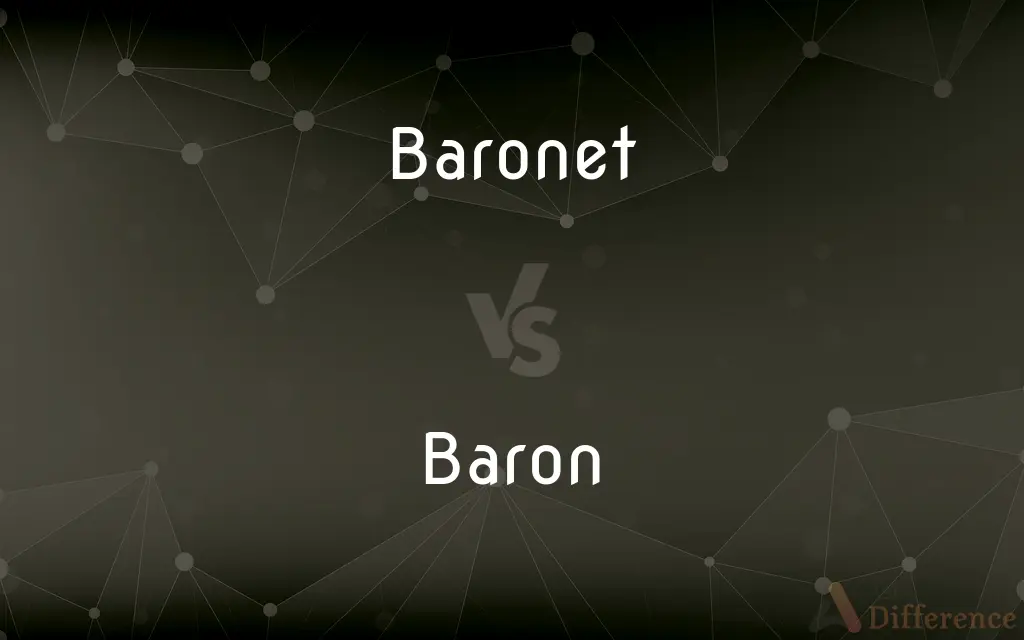Baronet vs. Baron — What's the Difference?
By Tayyaba Rehman & Fiza Rafique — Updated on March 24, 2024
A baronet is a hereditary title below a baron, offering a form of non-peerage nobility, while a baron is the lowest rank of the British peerage.

Difference Between Baronet and Baron
Table of Contents
ADVERTISEMENT
Key Differences
A baronet, in the British system of nobility, holds a unique position. Unlike peers, baronets are hereditary titleholders but do not have the right to sit in the House of Lords solely by virtue of their title. The title of baronet was created in 1611 by James I of England as a means of raising funds. Baronets often use the prefix "Sir" followed by their first name, while their wives can use the title "Lady." In contrast, a baron is a member of the peerage, the lowest rank within the British aristocracy, and traditionally had the right to sit in the House of Lords, though this has been modified by recent reforms.
Barons are part of the peerage system, which means they hold their titles for life and can potentially pass their titles to their heirs, depending on the letters patent that created the title. Barons typically use the title "Lord" or "Lady" before their name. The distinction between a baronet and a baron is significant in terms of both prestige and privilege, particularly regarding the right to participate in the legislative process. While baronets have a hereditary title, they do not have the same legislative rights as barons, who are peers.
The creation of the baronetcy was intended as a means of raising funds for the Crown with the promise of social status, but not inclusive of the political privileges afforded to the peerage. This makes the baronetcy an interesting hybrid of nobility and commonality, offering prestige without direct political power. Meanwhile, the rank of baron has ancient origins and has been a cornerstone of the British peerage system, entailing both prestige and responsibilities, including historical involvement in the governance of the country through the Parliament.
The roles and recognition of baronets and barons have evolved over time, with changes in the political landscape and societal values. Today, the distinction remains a matter of ceremonial significance and social prestige rather than practical political influence, especially after the House of Lords Act 1999, which limited the automatic right of hereditary peers, including barons, to sit in the House of Lords.
Despite their differences, both titles are markers of the rich tapestry of British nobility and historical traditions. The distinction between a baronet and a baron illustrates the nuanced hierarchy within the British system of titles, blending aspects of heritage, honor, and duty in unique ways.
ADVERTISEMENT
Comparison Chart
Rank
Non-peerage nobility, below a baron.
The lowest rank of the peerage.
Rights
Do not have the right to sit in the House of Lords.
Traditionally had the right to sit in the House of Lords.
Title Inheritance
Hereditary, can be passed to heirs.
Typically hereditary and can be passed to heirs.
Title Prefix
"Sir" for men, with wives able to use "Lady."
"Lord" or "Lady" before their name.
Origin
Created in 1611 by James I to raise funds for the Crown.
Ancient origins, a cornerstone of the British peerage system.
Compare with Definitions
Baronet
Uses "Sir" Prefix.
Sir John and Lady Smith attended the ceremony.
Baron
Hereditary Title.
Lord Smith's barony will be passed to his eldest child.
Baronet
Social Prestige.
The Smith family, baronets for generations, are well-regarded in their community.
Baron
Lowest Peerage Rank.
Lord John Smith, a baron, is part of the British peerage.
Baronet
Non-peerage Rank.
Despite being a baronet, Sir John cannot sit in the House of Lords.
Baron
Political and Social Status.
As a baron, Lord Smith holds a position of both prestige and responsibility.
Baronet
Hereditary Title.
Sir John Smith, a baronet, inherited his title from his father.
Baron
Ancient Origins.
The title of baron has been a key element of English nobility for centuries.
Baronet
Created for Funding.
The baronetcy was purchased by Sir John's ancestor in 1611.
Baron
Legislative Rights.
Historically, Lord Smith would have had the right to sit in the House of Lords.
Baronet
The bearer of a hereditary title, below a peerage and senior to most knighthoods, accompanied by the titular prefix "Sir" (for men) or "Dame" (for women) which is used in conjunction with the holder's Christian name. It is inheritable, usually by the eldest son, although a few baronetcies can also pass through the female line.
Baron
A British nobleman of the lowest rank.
Baronet
A baronet ( or ; abbreviated Bart or Bt) or the rare female equivalent, a baronetess (, , or ; abbreviation Btss), is the holder of a baronetcy, a hereditary title awarded by the British Crown. The practice of awarding baronetcies was originally introduced in England in the 14th century and was used by James I of England in 1611 as a means of raising funds.
Baron
Baron is a rank of nobility or title of honour, often hereditary, in various European countries, either current or historical. The female equivalent is baroness.
Baronet
A man holding a British hereditary title of honor reserved for commoners, ranking immediately below the barons and above all orders of knighthood except the Garter.
Baron
A member of the lowest order of the British nobility. Baron is not used as a form of address, barons usually being referred to as ‘Lord’.
Baronet
Used as the title for such a man.
Baron
An important or powerful person in a specified business or industry
A press baron
Baronet
A dignity or degree of honor next below a baron and above a knight, having precedency of all orders of knights except those of the Garter. It is the lowest degree of honor that is hereditary. The baronets are commoners.
Baron
A nobleman of continental Europe, ranked differently in various countries.
Baronet
A member of the British order of honor; ranks below a baron but above a knight;
Since he was a baronet he had to be addressed as Sir Henry Jones, Bart.
Baron
A Japanese nobleman of the lowest rank.
Baron
Used as the title for such a nobleman.
Baron
A feudal tenant holding his rights and title directly from a king or another feudal superior.
Baron
A lord or nobleman; a peer.
Baron
One having great wealth, power, and influence in a specified sphere of activity
An oil baron.
Baron
A cut of beef consisting of a double sirloin.
Baron
The male ruler of a barony.
Baron
A male member of the lowest rank of English nobility (the equivalent rank in Scotland is lord).
Baron
(by extension) A person of great power in society, especially in business and politics.
Baron
A prisoner who gains power and influence by lending or selling goods such as tobacco.
Baron
A baron of beef, a cut made up of a double sirloin.
Baron
Any of various nymphalid butterflies of the genus Euthalia.
Baron
A husband.
Baron
A title or degree of nobility; originally, the possessor of a fief, who had feudal tenants under him; in modern times, in France and Germany, a nobleman next in rank below a count; in England, a nobleman of the lowest grade in the House of Lords, being next below a viscount.
Baron
A husband; as, baron and feme, husband and wife.
Baron
A nobleman (in various countries) of varying rank
Baron
A British peer of the lowest rank
Baron
A very wealthy or powerful businessman;
An oil baron
Common Curiosities
What is the main difference between a baronet and a baron?
A baronet is a hereditary title offering non-peerage nobility, while a baron is the lowest rank of peerage with legislative rights.
What title do the wives of baronets and barons use?
Wives of baronets can use the title "Lady," while wives of barons are referred to as "Lady" followed by their surname.
What does the prefix "Sir" indicate?
The prefix "Sir" is used by baronets and knights, indicating a title of honor or nobility.
How does one become a baronet?
The title of baronet is hereditary, passed from parent to child, originally created as a means for the Crown to raise funds.
Is the title of baronet still being created today?
The creation of new baronetcies is rare but still possible under the Crown's prerogative.
Do baronets have any special privileges?
While baronets do not have legislative privileges, they hold social prestige and certain ceremonial honors.
Can a baronet sit in the House of Lords?
No, baronets do not have the right to sit in the House of Lords based solely on their title.
How do baronets and barons differ in their participation in governance?
Barons have historically had the right to participate in the legislative process through the House of Lords, unlike baronets.
Can a baron's title be inherited?
Yes, baron titles are typically hereditary and can be passed down to the next generation.
What is the historical significance of baronies?
Baronies have ancient origins and have played a significant role in the structure of British nobility and governance.
How are disputes over succession of titles resolved?
Disputes are typically resolved through the Committee for Privileges and Conduct of the House of Lords or through legal proceedings.
How has the role of barons in the House of Lords changed?
The House of Lords Act 1999 reformed their role, limiting the automatic right of hereditary peers, including barons, to sit in the House of Lords.
Can women hold the title of baronet or baron?
Yes, women can inherit or be granted the title of baroness and, in certain circumstances, can be baronets.
Share Your Discovery

Previous Comparison
Kirtle vs. Surcoat
Next Comparison
Spotify vs. SiriusAuthor Spotlight
Written by
Tayyaba RehmanTayyaba Rehman is a distinguished writer, currently serving as a primary contributor to askdifference.com. As a researcher in semantics and etymology, Tayyaba's passion for the complexity of languages and their distinctions has found a perfect home on the platform. Tayyaba delves into the intricacies of language, distinguishing between commonly confused words and phrases, thereby providing clarity for readers worldwide.
Co-written by
Fiza RafiqueFiza Rafique is a skilled content writer at AskDifference.com, where she meticulously refines and enhances written pieces. Drawing from her vast editorial expertise, Fiza ensures clarity, accuracy, and precision in every article. Passionate about language, she continually seeks to elevate the quality of content for readers worldwide.














































